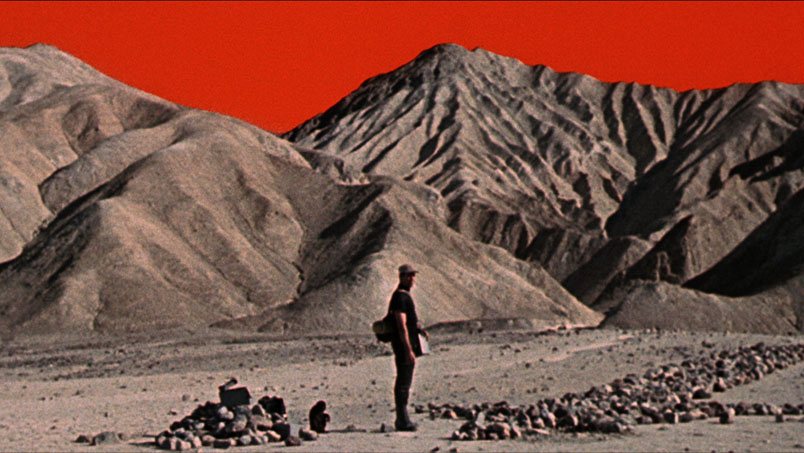Review: Robinson Crusoe on Mars (1964)
Like many works of science fiction, Robinson Crusoe on Mars borders on both the silly and the sublime. Like its sci-fi predecessors of the 1950s (in particular Forbidden Planet), Byron Haskin’s 1964 film sets the unabashedly fantastic alongside efforts at scientific accuracy (or science-based prediction), goofy humour next to life-and-death situations, and corny sentiment and hopeful yearning amid visions of an inhospitable universe. For instance, most of the stranded astronaut’s time on Mars is spent searching for shelter, oxygen, and food—but he still packs a revolver! He has a pet monkey, but that doesn’t stop him (or the viewer) from experiencing convincing isolation and despair. Is Robinson Crusoe on Mars sublime in spite of its goofiness, or is the film’s effect a product of its tensions?
The film is a loose adaptation of Daniel Defoe’s famous novel, but the protagonist isn’t named Robinson Crusoe. He is Commander Christopher “Kit” Draper, and he actually compares his own situation to Defoe’s hero’s in the movie. On a flyby mission, Draper’s spaceship crash lands on Mars, a barren planet with minimal oxygen in its atmosphere. How he manages to survive, and whether or not he encounters his own Friday, I’ll leave you to find out.
Made half a decade before the Apollo 11 moon landing and nearly a year before Mariner 4 captured the first close-up images of the actual Martian surface, the film remains one of the more accurate depictions of the Martian landscape in classic science fiction cinema. The film was shot on location in Death Valley, and blue-screen effects were used to create an eerie sky consisting of a reddish orange strip below a field of stars, suggesting the thin atmosphere of the planet. Some of the other special effects, such as the space ship, don’t hold up as well.
In spite of its limitations, Robinson Crusoe on Mars still manages to fire my imagination and stir something deep within me, in ways more powerful than the average special effects extravaganza made today. I saw parts of this film on television as a child with my dad, and they left a strong impression on me, lingering in my distant memory. When I finally saw the entire film as an adult, it still powerfully affected me, perhaps because I was living alone in Kingston at the time. I love the idea of space exploration, and this film captures the feelings I associate with it so well—the loneliness, the thrilling newness, the awe and wonder of viewing strange and stark alien worlds. The haunting score by Van Cleave reinforces those feelings. I don’t know if Robinson Crusoe on Mars is a great movie. What I do know is that, at different times in my life, it has moved me greatly.
9 out of 10
Robinson Crusoe on Mars (USA, 1964)
Directed by Byron Haskin; screenplay by Ib Melchior and John Higgins, based on a story by Daniel Defoe; starring Paul Mantee, Victor Lundin, Adam West, and Barney, the Woolly Monkey.
